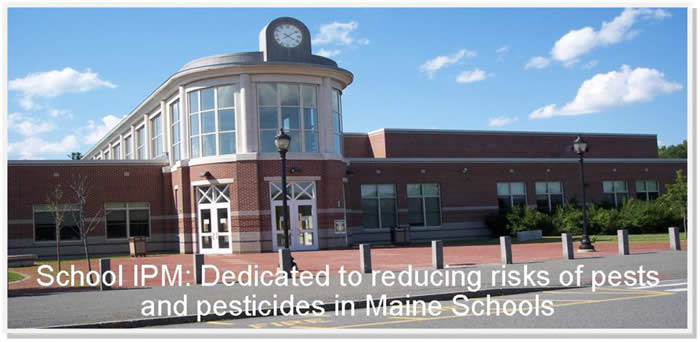DACF Home → Bureaus & Programs → Division of Animal and Plant Health → Integrated Pest Management → School IPM
School IPM Program

What is IPM?
Integrated pest management (IPM) is a common-sense, sustainable approach to preventing and managing pests. IPM enables schools to manage pests through regular pest monitoring, effective communication, good facilities management practices, and combinations of smart effective tactics including pest traps, good property management practices, and selective use of chemicals when needed.
With IPM, schools can protect human health and the environment while saving money. More: An Ounce of Prevention Brochure (PDF).
IPM is the 'standard of practice' for pest prevention and management in buildings and grounds to protect people and promote academic success.
Maine Schools are Required to Use IPM. All Maine schools, both public and private, are required to adopt IPM policies and practices and appoint an IPM coordinator. A quick guide to Maine's school IPM requirements - Maine School IPM Brochure (PDF).
IPM Basics
- Be prepared. What pests can you expect and how can you avoid them? Learn which tactics work—and under which conditions—if pests show up in school buildings, playgrounds and athletic fields.
- Think prevention. Keep pests out with sealants, door-sweeps, and screens; keep it clean and dry--inside and out; keep plants and lawns healthy to resist pests
- Stay alert. Scout routinely, keeping tabs on potential pests. Know your threshold—the point when a few pests become a few too many.
- Choose and use. Choose tactics and tools for the best results that protect children, staff and visitors--and Maine's valuable natural resources, too--while staying within budget. Whatever option you settle on—do it right! Plan carefully, make smart choices, and keep records!
- Evaluate. How did it work? How much has the situation changed? What did you learn? What is left to learn?
For the IPM Coordinator
For the Administrator
Required
- You must appoint an IPM Coordinator and annually REPORT the name and contact information of your IPM Coordinator designee using the DOE NEO Staff Data Report
- School board must approve an IPM Policy. See sample and/or guidance below or contact Maine School Management Association for sample policy.
- Sample Maine IPM Policy: DOC / PDF
- Model Pesticide Safety/IPM Policy Guidance (EPA)
- You must publish an IPM Notice in your school policy manuals (eg student/staff handbooks).
- Compliance Checklist (PDF)
Additional Resources
- Bid and Contract Guidance (PDF) (EPA)
- Saving Dollars and Making Sense (PDF)
- Health Benefits of School IPM (EPA)
- Self-Paced IPM Learning Modules for Administrators: Lesson 1 / Lesson 2
- More free IPM Learning Modules at: Pest Defense for Healthy Schools
- IPM Cost Calculator (TAMU)
- For Maine School Business Officials - presentation at MEASBO conference (PDF)
For the Teacher
- Lessons and Activities for the Classroom
- Self-Paced IPM Learning Modules for Teachers: Lesson 1 / Lesson 2
- More free IPM Learning Modules at: Pest Defense for Healthy Schools
For the Parent
For the School Nurse
- Posters: Small posters are 8.5x11. Large posters are 11x17. Available as PDFs.
- Guidance for the School Nurse Factsheets (NE IPM Center/EPA)
- Wallet Cards (NE IPM Center/EPA): Rodents / Head Lice / Ticks / Mosquitoes / Stinging Insects / Mold / Poisonous Plants / Bed Bugs
- More Health-related Pest Resources
- Bed Bug Guidance (Maine CDC)
- Bed Bugs and Schools (US EPA)
- Head Lice IPM (US EPA) and Head Lice Treatment (US CDC)
- Health Benefits of IPM (EPA)
- Schools for Health (Harvard School of Public Health)
- Tick Safety in Schools (EPA)
- NE School Nurse Survey Report (PDF)
- Training Modules and Presentations
- School Nurses: Crucial to School IPM Program Success (PDF)
- Self-Paced Learning Modules for the School Nurse Lesson 1 / Lesson 2
- More free IPM Learning Modules at: Pest Defense for Healthy Schools
- What's Bugging Maine Schools? (PDF)
Maine College IPM Programs
While the Maine School IPM Regulations (Chapter 27) only apply to public and private K-12 schools in Maine, we encourage colleges to implement IPM programs as well, and many of the resources on this website can help in developing a program at your college. Some important pieces to keep in mind:
- All Maine pesticide laws apply to college campuses in Maine. It is especially important to review:
- Any buildings or fields used by Children in K-12 Schools on a regular basis must comply with Ch. 27 Standards for Pesticide Application and Public Notification in Schools (Word)
- Municipal Ordinances may also be in place in the towns with college campus and should be considered, however, the State of Maine cannot regulate rules within town ordinances. Here is a comprehensive list of all towns with municipal ordinances.
Example College IPM Plans & Resources
The following plans and resources may help guide colleges while developing an IPM plan
- Penn State's Campus IPM Homepage – several links and useful documents
- University of New England IPM Plan (PDF)
- University of New England IPM Presentation (PDF)
- UMaine Pest Management Services RFP (PDF) – Example Request for Proposal (RFP) from the University of Maine System with Integrated Pest Management incorporated.
- Maine IPM Council – feel free to reach out to the council and submit plans for review and feedback